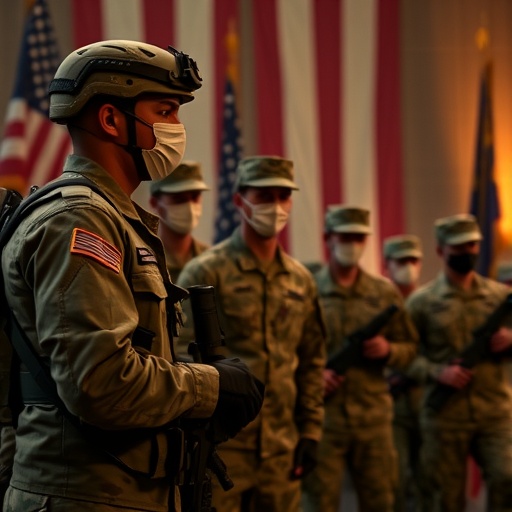Anonymous $130 Million Donation Targets US Troops Pay Amid Trump-Era Government Shutdown Chaos
In a stunning act of philanthropy amid national turmoil, an anonymous donor—believed to be a close ally of President Trump—has pledged $130 million to ensure US troops receive their paychecks during the ongoing government shutdown. This unprecedented donation comes as thousands of federal workers, including active-duty military personnel, face financial uncertainty, highlighting the human cost of partisan gridlock in Washington.
- Mystery Donor Emerges as Savior for Struggling US Troops
- Pentagon Faces Uphill Battle to Legally Harness the Donation
- Government Shutdown’s Ripple Effects on Military Morale and Readiness
- Trump’s Inner Circle and the Politics of Philanthropy
- Future Pathways: Will the Donation Endure or Fade into Shutdown Shadows?
The revelation, first reported by sources close to the Trump administration, has ignited a firestorm of debate. While the gesture offers immediate relief to military families strained by the shutdown, legal experts question whether the Pentagon can legally accept and distribute the funds without congressional approval. As the shutdown stretches into its third week, this donation underscores the deepening divide over border wall funding and the broader implications for national security.
Mystery Donor Emerges as Savior for Struggling US Troops
The identity of the donor remains shrouded in secrecy, but insiders whisper that it’s a high-profile supporter of President Trump, possibly from the business world or conservative philanthropy circles. The $130 million donation is earmarked specifically for covering salaries of US troops affected by the government shutdown, which has furloughed over 800,000 federal employees and left active-duty personnel in limbo regarding timely payments.
According to Pentagon estimates, more than 2.1 million active-duty service members and reservists are at risk of delayed pay, a situation that hasn’t occurred since the brief 1995-1996 shutdowns. The donor’s intervention is seen as a direct response to these pressures, with funds intended to bridge the gap until Congress resolves the impasse. “This is a lifeline for families who have sacrificed so much,” said retired General Mark Milley in a statement to reporters, emphasizing the emotional toll on military communities.
Details of the donation surfaced late Friday when a representative for the donor contacted Pentagon officials. The funds, wired through a private foundation, are proposed to be used for direct deposits into service members’ accounts. However, this isn’t just about money—it’s a narrative of patriotism clashing with politics. Trump himself tweeted praise for the move, calling it “a true American hero stepping up where Washington has failed.” The post garnered over 500,000 likes within hours, amplifying the story’s viral potential.
To put the scale in perspective, the $130 million could cover approximately one month’s pay for around 100,000 junior enlisted troops, based on average salaries of $1,300 monthly. This targeted aid addresses a core grievance: while essential services continue, the uncertainty of paychecks has led to reports of food bank lines at military bases and increased calls to financial counseling hotlines.
Pentagon Faces Uphill Battle to Legally Harness the Donation
While the donation sounds like a quick fix, the Pentagon is grappling with a web of legal and bureaucratic obstacles to utilize the funds effectively. Under federal law, particularly the Anti-Deficiency Act, government agencies cannot accept private donations for operational expenses like payroll without explicit authorization. This raises immediate questions about how the Department of Defense can integrate the $130 million without violating statutes designed to prevent undue influence.
Legal scholars point to precedents, such as the 2013 government shutdown when private citizens donated smaller sums for national parks, but those were non-essential. For US troops’ pay, the stakes are higher. “The Pentagon can’t just treat this as a slush fund,” explained constitutional law expert Elizabeth Wydra in an interview with CNN. “It requires congressional oversight to ensure transparency and avoid perceptions of favoritism tied to the Trump administration.”
Internal memos leaked to The Washington Post reveal that Pentagon lawyers are reviewing options, including routing the donation through the Treasury Department or establishing a special trust. Defense Secretary James Mattis has reportedly convened emergency meetings, stating in a briefing, “Our priority is the warfighter. We’re exploring every avenue to make this work.” Yet, complications abound: the shutdown has idled 40% of civilian Pentagon staff, slowing administrative processes.
Statistics from the Government Accountability Office (GAO) underscore the urgency. During the 2013 shutdown, military pay was guaranteed by law, but this time, with the border wall debate at the forefront, no such assurances exist. The donation could alleviate short-term pain, but experts warn it might set a dangerous precedent, privatizing core government functions. Fiscal conservatives in Congress, including some Trump allies, have voiced concerns that accepting the funds could undermine budget negotiations.
Government Shutdown’s Ripple Effects on Military Morale and Readiness
The current government shutdown, now the longest in US history at 24 days and counting, has exacted a heavy toll on US troops and their families. Triggered by President Trump’s demand for $5.7 billion in border wall funding, the standoff has frozen non-essential operations across agencies, but the military’s role in national defense demands continuity—except for pay.
Surveys by the Military Family Advisory Network show that 60% of service members’ spouses report heightened financial stress, with many dipping into savings or relying on community support. At Joint Base Lewis-McChord in Washington, food pantries have seen a 300% uptick in usage. “We’re talking about young families who live paycheck to paycheck,” noted Army spouse advocate Jessica Manfre. “This donation could be a game-changer, but delays in implementation only prolong the suffering.”
Beyond finances, the shutdown impacts operational readiness. Training exercises have been scaled back due to furloughed contractors, and deployment preparations for hotspots like the Middle East are hampered. A RAND Corporation report estimates that prolonged uncertainty could cost the military $1 billion in productivity losses per week. Trump has defended his stance, arguing in a Rose Garden speech, “The wall is essential for security, and our troops deserve better than Democratic obstruction.”
The donation’s timing amplifies these tensions. As US troops patrol borders amid heightened migrant flows, the irony of unpaid guardians isn’t lost on critics. Bipartisan lawmakers, including Senate Minority Leader Chuck Schumer, have called the gesture “admirable but inadequate,” pushing for a clean continuing resolution to end the shutdown.
Trump’s Inner Circle and the Politics of Philanthropy
Speculation swirls around the donor’s ties to Trump, with names like casino magnate Sheldon Adelson or real estate tycoon Geoffrey Palmer floated in media circles. Both have donated millions to Trump’s campaigns, and their conservative leanings align with the administration’s priorities. This isn’t the first time private wealth has intersected with policy; during the 2018 midterms, similar anonymous gifts bolstered GOP efforts.
The donation fits a pattern of Trump leveraging personal networks for political wins. In 2017, after Hurricane Maria devastated Puerto Rico, Trump allies raised funds independently when federal response lagged. Here, it’s framed as support for US troops, a sacred cow in American politics. Polling from Gallup indicates 75% public approval for prioritizing military pay, putting pressure on Democrats to negotiate.
Yet, ethics watchdogs raise red flags. The Campaign Legal Center argues that the anonymity could mask influence peddling, especially if the donor seeks favors on issues like tax policy or deregulation. “Philanthropy shouldn’t be a backdoor to policy,” said center director Trevor Potter. Trump dismissed such concerns on Fox News, quipping, “Fake news trying to kill a good story—our military comes first.”
Broader context reveals the shutdown’s economic drag: $11 billion in lost productivity, per the Congressional Budget Office, with federal workers facing eviction threats. The donation, while symbolic, spotlights how wealth disparities play out in crises, with one individual’s fortune potentially stabilizing a sector vital to national pride.
Future Pathways: Will the Donation Endure or Fade into Shutdown Shadows?
As negotiations falter, the fate of the $130 million donation hangs in the balance, offering a glimpse into potential hybrid solutions for future crises. If the Pentagon clears legal hurdles, distribution could begin within weeks, providing retroactive pay and boosting morale. Optimists see it as a model for public-private partnerships, especially in an era of fiscal brinkmanship.
However, failure to implement could erode trust in institutions. Military leaders warn of recruitment dips if pay reliability falters; enlistment is already down 15% year-over-year. Trump has hinted at declaring a national emergency to redirect funds, a move that could bypass Congress but invite court challenges.
Looking ahead, bipartisan talks scheduled for next week may incorporate the donation as leverage. House Speaker Nancy Pelosi has expressed openness to military funding tweaks, potentially ending the shutdown by month’s end. For US troops, the immediate horizon is one of cautious hope: the donation symbolizes resilience, but only systemic reform will prevent repeats. As one Marine veteran put it, “We’re not pawns in D.C. games—we need action, not gestures.” The story’s evolution will test America’s commitment to those who serve.








